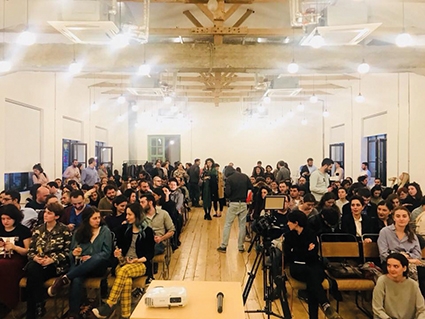Tbilisi Startup Bureau Takes Aim at Georgia’s Entrepreneurship Economy
The Tbilisi Startup Bureau is not, as the name suggests, a government agency, but is in fact itself a startup, founded by two young men with the goal of supporting the development of entrepreneurship in Georgia with a focus on technology. The Bureau is yet another example of active Georgian residents seeing a gap in the economic and social fabric of the country, and taking the initiative to fill it. Instead of waiting for government policies to support entrepreneurship to have an effect, Hayk Asriyants and Guri Koiava decided to chart their own course through the at times cut-throat, at times cooperative world of startups in Georgia.
GEORGIA TODAY sat down with the founders to discuss what they are doing, their vision for their company, and why everyone should be paying attention to the South Caucasus entrepreneurship scene.
Asriyants and Koiava began toying with the idea of creating their own business in the autumn of 2017, and by April 2018, they had established Tbilisi Startup Bureau. The pair’s initial idea was to create a business accelerator, but realized that before an accelerator could really be viable as a private, standalone entity, they needed to strengthen Georgia’s startup industry. Today, Tbilisi Startup Bureau is a private company that aims to develop the startup ecosystem in Georgia by supporting other private companies to get off the ground, encouraging entrepreneurship, and launching conversations between established business leaders and new businesses.
Asriyants, 33, is originally from Yerevan. After working in the telecommunications industry for several years, and being active in organizing and hosting entrepreneurship related events in Armenia, he moved to Tbilisi in 2011. In his words, it’s “a classic story...I came here as a tourist, fell in love with the city and the country, and decided to stay.” It “felt natural,” he says, to cross the border and bring these entrepreneurship-focused programs with him, to engage a new audience.
The other half of the team, Koiava, is 30 years old, from Tbilisi. An MBA from Riga Business School and an early career at a Youth NGO in Latvia and the Georgian National Tourism Administration as leisure, travel and tourism professional prepared him to reach out to an international audience and lead marketing and sales efforts. After bringing several large-scale music festivals to Georgia, Koiava sought out a new challenge, to push himself into a more engaging, self-led environment.Tbilisi Startup Bureau now runs several programs, aimed at a variety of audiences. Their most popular program is ‘Fuckup Nights Tbilisi,’ an edutainment-type event that draws a mixed crowd, both from the startup community and those interested in hearing stories of failures and recovery from successful business people from around the region. Their latest event, last Thursday, was part of an occasional English-language series, and featured one of Georgia’s biggest celebrities, basketball player and entrepreneur Zaza Pachulia, and Turkey’s Ambassador to Georgia, Fatma Ceren Yazgan.
They partner with governmental and non-governmental organizations, including Enterprise Georgia, the Ministry of Environmental Protection and Agriculture, Georgian Farmers’ Association, Young Farmers’ Association, the Georgian Innovation and Technology Agency, and Tbilisi City Hall.
They have organized several hackathons, including the worldwide 48-hour NASA Space Apps Challenge. Last October, Tbilisi Startup Bureau brought a group of young people to Abastumani to tap into the trend of space science, and think critically about how NASA’s open data can be used to solve problems here on earth, from wildfires and water shortages to how internally displaced persons and ecological migrant affect the environment. The Night Economy Hackathon, sponsored by Tbilisi City Hall, invited participants to contribute ideas to grow Tbilisi’s after-hours business potential. The Future Agro Challenge event in May focused on issues of food waste, hunger, and how agriculture can be attractive to young people, introducing modern technologies. They have also organized a PechaKucha Night in Georgia: an event series that began in Japan to encourage creators and artists to be more entrepreneurial.
When asked about their business philosophy, Asriyants explains that they believe in cooperation: “it’s not a zero-sum game.” The team, though, does believe that private businesses can do a better job of guiding and supporting entrepreneurs than the parade of non-governmental organizations that are currently active in the field, particularly in rural areas. “Non-governmental organizations don’t understand the struggle of entrepreneurship, of starting a business,” they explain.
Tbilisi Startup Bureau has its fingers in many pies and they plan to expand further. They want to equip people with the hard skills they need to start a business and encourage them to take the risk, they want to reach out to rural areas and underprivileged communities that don’t have access to infrastructure or even a reliable internet connection, they want to be active in every part of the startup ecosystem, from developing and architecting the social and economic infrastructure to advocating for public support for underdeveloped components. Eventually, they plan to give life to their original idea, a business accelerator.
Musing on why Georgia has a lack of entrepreneurship in the first place, Asriyants and Koiava say that people are, of course, risk-averse. They want to do what they know already works, perhaps shedding light on the phenomenon of copy-cat businessessuch as hair salons, second clothing shops and dentists lining the same street. “Part of it is culture...a conservative mentality,” says Asriyants. While they have not yet landed on the perfect formula for convincing someone to take the risk, to become an entrepreneur, they say a good place to start is focusing on youth and those “startups who want to disrupt an industry, who want to innovate, who have big ideas.” Women are also a target group: “We believe in the economic empowerment of women, we want them to start businesses…. we believe that one of the problems of Georgia is that women are not engaged.”
Asriyants enthuses, smiling, “We want to make entrepreneurship attractive to everyone!”
By Samantha Guthrie
Image source: Tbilisi Startup Bureau











